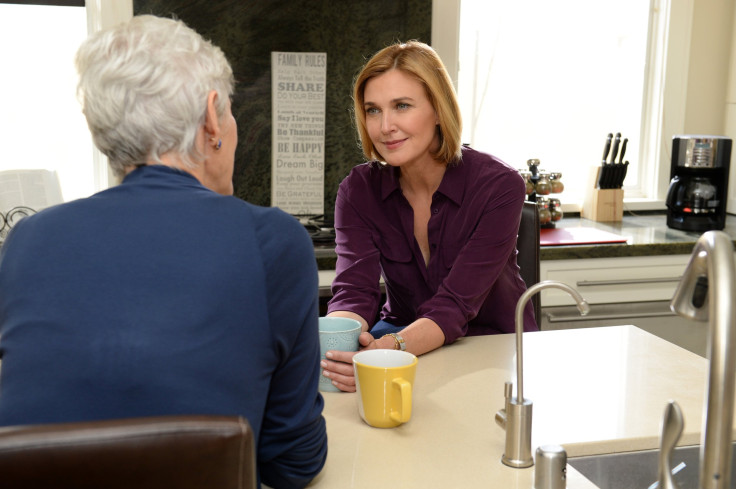Understanding Menopause With Brenda Strong: How The Actress Handles 'The Other Talk'

Menopause is a stage in a woman’s life that accompanies many symptoms, common misconceptions, and, oftentimes, uncomfortable questions. Emmy-nominated Brenda Strong, who is best known for her roles on Desperate Housewives, Dallas, and Scandal has become the face of a new approach to inspiring women to discuss the menopause stage with family, friends, and their doctors.
Strong spent a good deal of her life empowering women through yoga and started a company called “Strong Yoga for Women” after discovering the benefits it could have for women and their reproductive organs. She learned as a certified yoga instructor, the ancient practice had the power to circulate blood flow and balance hormones in a way that was helping women who were having trouble conceiving become pregnant.
“It evolved into really helping women transition through every age and stage in their lives in a graceful, easy way,” Strong told Medical Daily. “Because life is not always easy for us women — many of us struggle to have children or have difficult pregnancies. Now that I’m at or around that age where menopause is one of those stages, I started realizing there was not a lot I personally knew about it, and I was so happy I had the opportunity to not only learn more myself so I could work with other women, but to do it in a way that was funny and create this video with Pfizer for their ‘Let’s Talk About Change Campaign.’”
The video features the concept of “The Other Talk,” juxtaposing the beginning of a teenage daughter’s menstrual cycle and the mother’s major milestone of menopause. Just as mothers help their daughters become educated about their highly anticipated first period, the conversation on what to expect about menopause should be just as strongly emphasized in a woman’s life. It’s about giving women the confidence to seek out help, because there’s no reason to suffer in silence when there are treatments for their discomfort or pain.
“Every woman is unique so we can’t say, ‘you’re going to go through this,’ and have a blueprint,” Strong said. “We all have different bodies, different hereditary gene pools, and I think looking toward your own mother’s or sisters. I think it’s also about listening to yourself and not just about turning over your health. [There are] a lot of women out there who are not living easy lives and they’re uncomfortable in their bodies. We want to give them the opportunity to learn they don’t have to be.”
Disseminating information and dispelling myths, Strong says, is one of the most important aspects of the campaign and one of her driving motivations for helping spread awareness. By 2015, more than 45 percent of all women 18 years and older in the U.S. should be approaching the menopause stage or already be menopausal. Yet, the conversation is often kept behind closed doors or not spoken of at all because of the stigma and discomfort involved. Some of the symptoms are well known, such as hot flashes and night sweats, but one-third of women also experience painful sex due to vaginal atrophy — one of the least talked about menopausal changes of them all.
“Ultimately we are now living longer and a third of our lives are lived in menopause,” Strong said. “Why would we want to spend a third of our lives suffering or being uncomfortable, or not sleeping well, or not having a really wonderful full ranged relationship with our partners? We want to be empowered by having the information that keeps us healthier longer by taking care of our bodies through our lifestyles. There is a wealth of resources in natural eastern philosophies, but I don’t want to minimize Western philosophy either. There’s a reason why we need doctors.”
The more conversation there is, the easier it will be for more women to realize they’re not alone and should talk to their doctor. Dr. Michelle Warren, medical director and practicing physician of the Center for Menopause, Hormonal Disorders and Woman’s Health, speaks on the importance of a healthy and open relationship between doctors and patients.
“Building a relationship with your patients is extremely important or else they won’t trust what you say,” Warren told Medical Daily. “I think it’s extremely important for patients to become educated. If women become more comfortable talking about menopause, they’ll be able to acknowledge the changes happening in their body.”
It’s really interesting because my patients are on their way out the door with their hand on the doorknob by the time they even mention a change they find embarrassing. Menopause is a time in a woman’s life when her hormones evolve and the estrogen goes through particular changes.
“Although many women recognize the common symptoms of menopause, there are many, such as vagina atrophy, that can change their sex life and the relationship with their partner,” Warren said.
Women experience vagina atrophy without knowing what’s going on. Symptoms could include vaginal burning, itching, dryness, increased urgency to urinate, and painful intercourse. If sex becomes painful, it could mean the relationship with her partner is compromised because of the disconnection between healthy awareness and conversation between doctor, patient, and partner. Changing the stigmatized perception on menopause is the greatest key to healthy change, according to Warren, and the more women talk, the more comfortable they will become.



























